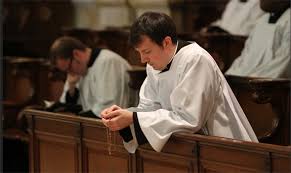It is of the essence to look at Catholic doctrine as one whole; by looking at it piecemeal we may end up distorting it, just as by interpreting it loosely we may sooner or later water it down completely.
Here is a case in point: as seen on Corpus Christi Sunday, Jesus’ words (Jn 3: 16-18) – “God so loved world that He gave His Only Son, that whoever believes in Him should not perish but have eternal life” – mean that outside the Church there is no salvation. And this is what the Catholic Church has taught down the ages.
As pointed out in our reflection last Sunday, the Catechism of the Catholic Church states that “those who, through no fault of their own, do not know the Gospel of Christ or his Church, but who nevertheless seek God with a sincere heart, and, moved by grace, try in their actions to do his will as they know it through the dictates of their conscience – those too may achieve eternal salvation” (CCC 847).
In short, Baptism is necessary for salvation of anyone who has heard the Good News and has had the possibility of asking for Baptism.

Risk of Concessions
On the other hand, concessions could lead the faithful to believe that anything goes. One such of my worst fears came true yesterday when I happened to attend the anticipated Sunday Mass at a chapel. The priest stated quite nonchalantly: “There is no need for baptism; living the Christian values is enough.”
In one stroke he had let the congregation know that they need not have come to church at all; just living a good life at home or elsewhere would suffice! Should we, then, dismantle our baptismal fonts?
When approached after Mass, the cleric tried to wriggle out from it at first but before long he admitted that his words were meant to appease a certain section… In the process, he had not only taken the congregation but even Our Lord Himself for granted. Thus, in a bid to sound politically correct, he had no qualms about being evangelically incorrect.
Who can deny the possibility of a non-sacramentally baptised person being saved, under the circumstances foreseen by the Catechism? But is it a cakewalk? If salvation of the baptised is difficult – for we have to pass through the narrow door – it is much more so for the non-baptised who have no access to the sacraments and other ordinary means of sanctification that God has provided to his Church!
That is why Pope Pius IX in his encyclical Quanto conficiamur moerore (10 August 1863), on promotion of false doctrines (cf. paras. 7, 8, 9, 11, 13), condemns those who believe that “good hope at least is to be entertained of the eternal salvation of all those who are not at all in the true Church of Christ” (Syllabus of Errors, 1864, para 17)
Newfangled Approach?

When a clarification was sought, the priest waxed eloquent about a “new approach” devised by the Church and, right or wrong, cited the present Pope. But then, the important point to remember is that no approach, whether old or new, is entitled to throw doctrine to the winds.
According to the so-called new approach, then, is the sacrament of Baptism only a dispensable ritual and no guarantor of supernatural life? Or am I to believe that supernatural life is nonexistent, or maybe unimportant, provided we have a good life? And should I stop believing that baptism has made me a child of God and Heaven more easily accessible?
In fact, without Baptism, we would have no access to any of the other sacraments either. More specifically, Holy Orders would be out of bounds: mustn’t priests, then, be in awe of the first Sacrament rather than make slighting references to it?
And what about the priest’s privilege to forgive sins and celebrate Mass? And if there were no Sacrament of Penance, would penitents be able to regain the grace lost through sins?
It is therefore not for nothing that St Paul has said that through baptism we “put on Christ”; and St Thomas teaches that the sacrament “configures” us to Christ!

Pray for Priests
For the above reasons and many more, let us hold the Sacraments in the highest esteem. No better person than the priest, who acts in Persona Christi, to set the example. He should by no means balance himself on the razor’s edge, lest he leave the parishioner confused and demoralised, if he has cared to listen to the homily.
I write this with a heavy heart but in the spirit of “bear[ing] one another’s burdens and so fulfil[ing] the law of Christ” (Gal. 6:1-2). Hence, I would like to end with Pope Benedict XVI’s prayer for Priests:
Lord Jesus Christ, eternal High Priest, you offered yourself to the Father on the altar of the Cross and through the outpouring of the Holy Spirit gave your priestly people a share in your redeeming sacrifice.
Hear our prayer for the sanctification of our priests. Grant that all who are ordained to the ministerial priesthood may be ever more conformed to you, the Divine Master. May they preach the Gospel with pure heart and clear conscience.
Let them be shepherds according to your own Heart, single-minded in service to you and to the Church and shining examples of a holy, simply and joyful life.
Through the prayers of the Blessed Virgin Mary, your Mother and ours, draw all priests and the flocks entrusted to their care to the fullness of eternal life where you live and reign with the Father and the Holy Spirit, one God, for ever and ever. Amen.
Banner: https://truthout.org/articles/the-shutdown-as-shock-doctrine/
I have no comments about the utterance of the chapel priest, but i too heard a chapel priest say something that made me lose my train of thought. Before the ‘our Father’, he politely requested the congregation not to lift their hands, saying it was him alone who was tasked with conveying the people’s petitions. But i digress. Every social club has its own norms and standards.
Chris, perhaps in the second part regarding raising of the hands only by the celebrant he was right. The Church advises the faithful to reverently join hands during the Our Father.
The Sacrament of Baptism is the main gateway to the rest of the 6 Sacraments. The Clergy cannot give their own interpretations and confuse the faithful. That is the reason there are more than 40,000 Christian sects since each group interprets differently on matters of faith. And to maintain unity in our creed we need the leader to speak unequivocally on matters of faith.
No wonder a priest I attended the Mass at today pronounced that ‘The enemies within the Church will work towards creating confusions’.
Shocking statement by the priest. We wonder what kind of formation is given in the Seminary.
It is understandable that comments like the one referred by Oscar can provoke discomfort, if not outrage, in the Faithful. We see change, not only in civil societies but also in communities of Faith. When I come across something that strikes me as a departure from the accepted teaching, I remind myself that Catholic doctrine has not remained immutable throughout the 20+Centuries of its existence. Change is normal, living organisms have to change/adapt. Dogmas, for example, were added by the Church in the course of years; the Marian dogma was brought on board in late 20th Century . We can expect more changes in our times and in future times. Indeed, right now several changes are being debated by the Curia and the Synod of Bishops. In the midst of this flux what is an individual person of Faith to do? Late in my years I found that the reading and re-reading of the Bible gives the reader a new understanding of Faith namely, what is fundamental and what is ornamental, in the best sense of the term. The Fundamental is – To Love God and to Treat Others as you would like to be treated (which I find easier to honour than “Love your Neighbour”, honestly). What has been added (and discarded) in the course of time was to enable the Church to Teach and Govern the swelling numbers of the Faithful so that there was a structure within which to operate; else, it would have been a bedlam. Some changes may scandalize, others may cause lesser discomfort; this is a problem that will stay with us, because every time one feature of the doctrine is relaxed, it is likely to torment the Faithful with the question – where is my Church going ? The Church itself recognizes this and acknowledges that while being the “Mater et Magistra” it is also a Pilgrim Church along with the Faithful.
I thank Óscar for the weekly reflexions he posts on this site, expressions of his exegesis and spirituality of a very high order indeed.
Dear António,
Thank you for reading and taking the time to comment, but do you think it licit to have a foundational principle changed? Baptism is centred on Our Lord Jesus Christ. Denying this sacrament is tantamount to denying Christ to the world and a loss of original identity.
Like Baptism, whatever belongs to the Sacred Deposit of the Faith is immutable, for para 84 of the CCC states: «The apostles entrusted the “Sacred deposit” of the faith (the depositum fidei), contained in the Sacred Scripture and Tradition, to the whole of the Church. “By adhering to [this heritage] the entire holy people, united to its pastors, remains faithful to the teaching of the apostles, to the brotherhood, to the breaking of bread and the prayers.”» (emphasis mine)
How, then, does a cleric dare contradict the Sacred deposit and misguide the congregation?
As regards dogmas: they are not, as you may tend to think, unnatural additions, much less contradictions; dogmas express in clear terms the immutable truths of faith that a Catholic has to believe in, some of them known since times immemorial.
In view of the above, don’t you think it proper that we walk our pilgrim way without making changes contrary to the foundational principles of our Faith?